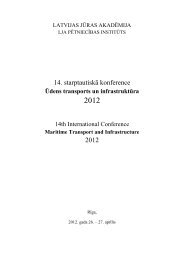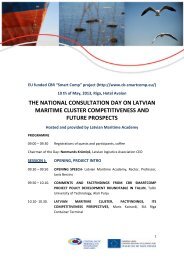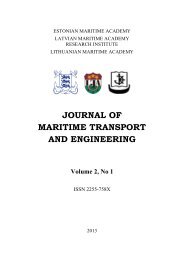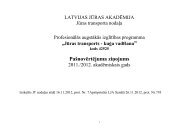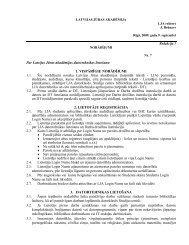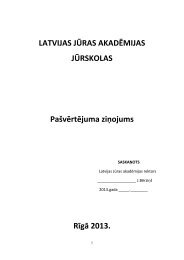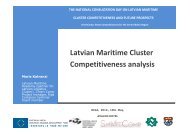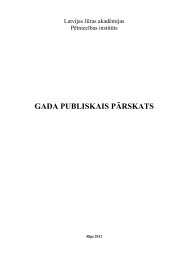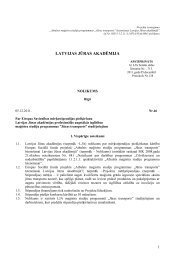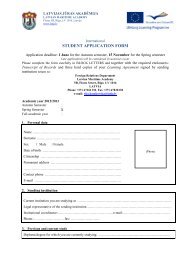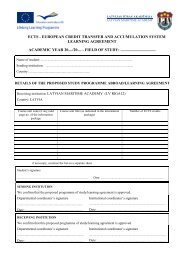Latvian Maritime academy
Latvian Maritime academy
Latvian Maritime academy
You also want an ePaper? Increase the reach of your titles
YUMPU automatically turns print PDFs into web optimized ePapers that Google loves.
– The were 25 who felt free to answer the large-scale questionnaire, which consists of 67 open<br />
questions;<br />
– 9 respondents answered the questionnaire negligently;<br />
– 16 tough future seafarers answered all questions of the questionnaire in about two academic<br />
hours.<br />
Empirical results can be applied only to the respondent population.<br />
European maritime self-concept from the historical – ideological point of view<br />
There was made the analysis of the transcendental ideal of European maritime self-concept from the<br />
point of view of the qualitative leap. The transcendental ideal of the European maritime self-concept was<br />
characterized. The mental closure in the pagan perception of space educates the closed maritime selfconcept.<br />
It promotes deification of waters. The sea is experienced as a mystery.<br />
The ancient man is naturally shy and gullible but also strong. Personality has not conciliated with<br />
the fearsome sea-mythology and strained to the relationship with sea, began and developed a seamanship.<br />
The personal sense of existential freedom is not based on the transcendence at the ideological level in the<br />
pre-monotheistic epoch. The value of the personality is not treated exclusively inter other elements of the<br />
cosmic nature.<br />
The monotheistic leap of self-consciousness in the Jewish civilization has opened a transcendental<br />
perspective of the maritime self-concept. God is above nature – the sea and land, and he is perceived as<br />
the Creator of the Universe from the monotheistic point of view. The God’s name is love in Hebrew. This<br />
qualitative leap has liberated the self-consciousness of the personality from the pagan mental-closure and<br />
formed a new conception of the sea.<br />
The water was created from love of the Creator. The water is not an office of gods but the work of<br />
the Creator. Therefore a monotheist can interact with water safely and responsibly, and the value of the<br />
personality is treated at the higher level. The man is created from love and he / she began to perceive the<br />
self-purpose for love, freedom and culture [3].<br />
Christianity has extended the idea of water and man. God has created the water and the man with<br />
love. This new idea of Christianity formed the classic European mentality, which led to development of<br />
the maritime self-concept, the rise of universities from monastic libraries, development of the maritime<br />
geographic discoveries, science, global and universal education and the first maritime schools. The<br />
personality value takes a top in the self-concept because the loving God not only created a man but also<br />
became a man. The sustainable and socially responsible relationship with the sea is a direction of the<br />
maritime self-concept because man is free, dignified and loving. This condition of the personality is based<br />
on the experience of the new self-esteem.<br />
The man sees the sea more pragmatically in the self-concept later at the level of decline of the<br />
transcendence. Global environmental problems were caused by the excessive exploitation of marine<br />
wealth and pollution. Integration of conventions of the sustainable development and upbringing of a<br />
conscious personality could and must solve ecological problems. The ideologically reduced value of the<br />
personality cannot guarantee a harmonious interaction with the sea in the post-protestant epoch. The use<br />
of the maritime self-concept as a mental tool of development of the personality enriches hodegetics and<br />
anthropologically and adequately promotes a harmonious expression of the human practice.<br />
The analysis of conditions of the maritime self-concept formation in the Middle Ages and the New<br />
Times was made. The Medieval era is enough controversial and consistently changing. The menacing<br />
biblical image of the sea appears as a fear factor [17].<br />
European education of monastic universities overshadows the menacing image of the sea in the late<br />
Middle Ages. The social situation of the maritime self-concept is more progressive ideologically in the<br />
late Middle Ages. The maritime sector is gradually recognized. Limits of perception of the value of the<br />
seafarer’s personality are extended. Seafarers began to gain social guarantees. A system of the social<br />
welfare of seafarers was created in some nautical countries.<br />
The new doctrine spread in the protestant era of the New Times. The man must understand oneself<br />
as an owner of the sea, which has been present by the loving Creator. Protestants did not limit themself at<br />
the level of Christian mythological tradition but aimed it to complement with a non-transcendental pre-<br />
Christian tradition, which is more positive and psychologically suggestive. It made influence to the<br />
content of valuable education of the personality. The socio-cultural content of valuable education was<br />
integral.<br />
However, later the maritime self-concept was characterized by the formal pragmatism, only<br />
empirical science and too active marine functionalism on developing of commercial maritime fleets from<br />
24



